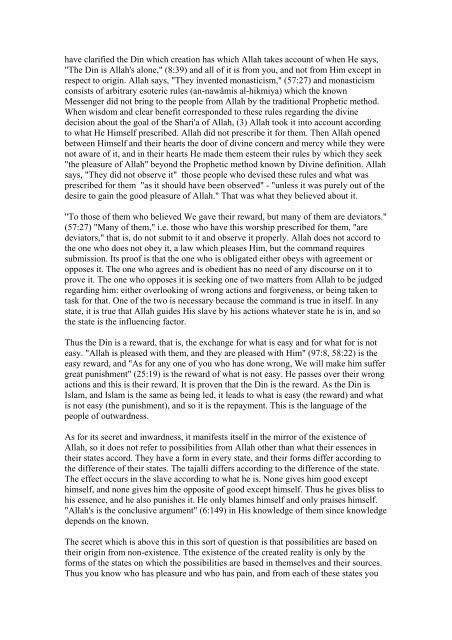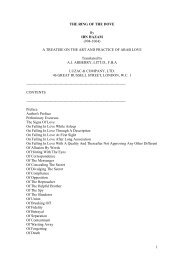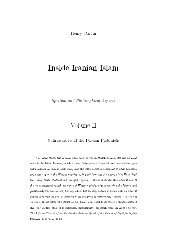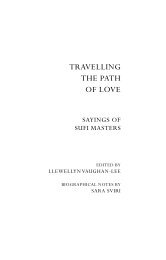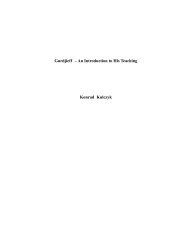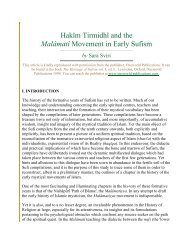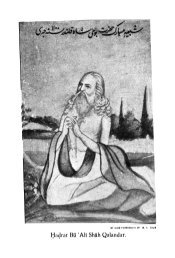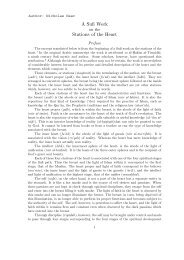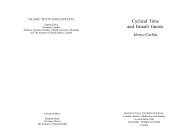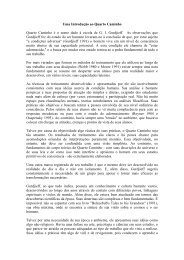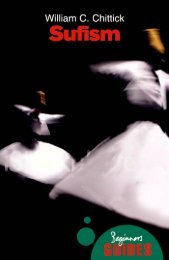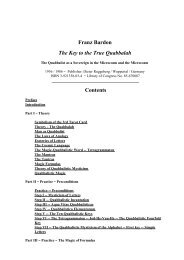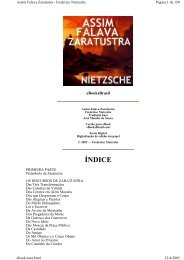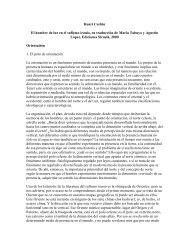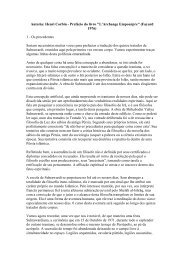Fusus al-Hikam The Seals of Wisdom by Shaykh al ... - ImagoMundi
Fusus al-Hikam The Seals of Wisdom by Shaykh al ... - ImagoMundi
Fusus al-Hikam The Seals of Wisdom by Shaykh al ... - ImagoMundi
You also want an ePaper? Increase the reach of your titles
YUMPU automatically turns print PDFs into web optimized ePapers that Google loves.
have clarified the Din which creation has which Allah takes account <strong>of</strong> when He says,<br />
"<strong>The</strong> Din is Allah's <strong>al</strong>one," (8:39) and <strong>al</strong>l <strong>of</strong> it is from you, and not from Him except in<br />
respect to origin. Allah says, "<strong>The</strong>y invented monasticism," (57:27) and monasticism<br />
consists <strong>of</strong> arbitrary esoteric rules (an-nawâmis <strong>al</strong>-hikmiya) which the known<br />
Messenger did not bring to the people from Allah <strong>by</strong> the tradition<strong>al</strong> Prophetic method.<br />
When wisdom and clear benefit corresponded to these rules regarding the divine<br />
decision about the go<strong>al</strong> <strong>of</strong> the Shari'a <strong>of</strong> Allah, (3) Allah took it into account according<br />
to what He Himself prescribed. Allah did not prescribe it for them. <strong>The</strong>n Allah opened<br />
between Himself and their hearts the door <strong>of</strong> divine concern and mercy while they were<br />
not aware <strong>of</strong> it, and in their hearts He made them esteem their rules <strong>by</strong> which they seek<br />
"the pleasure <strong>of</strong> Allah" beyond the Prophetic method known <strong>by</strong> Divine definition. Allah<br />
says, "<strong>The</strong>y did not observe it" those people who devised these rules and what was<br />
prescribed for them "as it should have been observed" - "unless it was purely out <strong>of</strong> the<br />
desire to gain the good pleasure <strong>of</strong> Allah." That was what they believed about it.<br />
"To those <strong>of</strong> them who believed We gave their reward, but many <strong>of</strong> them are deviators."<br />
(57:27) "Many <strong>of</strong> them," i.e. those who have this worship prescribed for them, "are<br />
deviators," that is, do not submit to it and observe it properly. Allah does not accord to<br />
the one who does not obey it, a law which pleases Him, but the command requires<br />
submission. Its pro<strong>of</strong> is that the one who is obligated either obeys with agreement or<br />
opposes it. <strong>The</strong> one who agrees and is obedient has no need <strong>of</strong> any discourse on it to<br />
prove it. <strong>The</strong> one who opposes it is seeking one <strong>of</strong> two matters from Allah to be judged<br />
regarding him: either overlooking <strong>of</strong> wrong actions and forgiveness, or being taken to<br />
task for that. One <strong>of</strong> the two is necessary because the command is true in itself. In any<br />
state, it is true that Allah guides His slave <strong>by</strong> his actions whatever state he is in, and so<br />
the state is the influencing factor.<br />
Thus the Din is a reward, that is, the exchange for what is easy and for what for is not<br />
easy. "Allah is pleased with them, and they are pleased with Him" (97:8, 58:22) is the<br />
easy reward, and "As for any one <strong>of</strong> you who has done wrong, We will make him suffer<br />
great punishment" (25:19) is the reward <strong>of</strong> what is not easy. He passes over their wrong<br />
actions and this is their reward. It is proven that the Din is the reward. As the Din is<br />
Islam, and Islam is the same as being led, it leads to what is easy (the reward) and what<br />
is not easy (the punishment), and so it is the repayment. This is the language <strong>of</strong> the<br />
people <strong>of</strong> outwardness.<br />
As for its secret and inwardness, it manifests itself in the mirror <strong>of</strong> the existence <strong>of</strong><br />
Allah, so it does not refer to possibilities from Allah other than what their essences in<br />
their states accord. <strong>The</strong>y have a form in every state, and their forms differ according to<br />
the difference <strong>of</strong> their states. <strong>The</strong> taj<strong>al</strong>li differs according to the difference <strong>of</strong> the state.<br />
<strong>The</strong> effect occurs in the slave according to what he is. None gives him good except<br />
himself, and none gives him the opposite <strong>of</strong> good except himself. Thus he gives bliss to<br />
his essence, and he <strong>al</strong>so punishes it. He only blames himself and only praises himself.<br />
"Allah's is the conclusive argument" (6:149) in His knowledge <strong>of</strong> them since knowledge<br />
depends on the known.<br />
<strong>The</strong> secret which is above this in this sort <strong>of</strong> question is that possibilities are based on<br />
their origin from non-existence. Tthe existence <strong>of</strong> the created re<strong>al</strong>ity is only <strong>by</strong> the<br />
forms <strong>of</strong> the states on which the possibilities are based in themselves and their sources.<br />
Thus you know who has pleasure and who has pain, and from each <strong>of</strong> these states you


